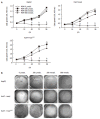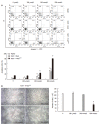Methylsulfonylmethane suppresses hepatic tumor development through activation of apoptosis
- PMID: 24575169
- PMCID: PMC3934636
- DOI: 10.4254/wjh.v6.i2.98
Methylsulfonylmethane suppresses hepatic tumor development through activation of apoptosis
Abstract
Aim: To investigate the effect of methylsulfonylmethane (MSM), recently reported to have anti-cancer effects, in liver cancer cells and transgenic mice.
Methods: Three liver cancer cell lines, HepG2, Huh7-Mock and Huh7-H-ras (G12V), were used. Cell growth was measured by Cell Counting Kit-8 and soft agar assay. Western blot analysis was used to detect caspases, poly (ADP-ribose) polymerase (PARP), and B-cell lymphoma 2 (Bcl-2) expressions. For in vivo study, we administered MSM to H-ras (12V) transgenic mice for 3 mo.
Results: MSM decreased the growth of HepG2, Huh7-Mock and Huh7-H-ras (G12V) cells in a dose-dependent manner. That was correlated with significantly increased apoptosis and reduced cell numbers in MSM treated cells. Cleaved caspase-8, cleaved caspase-3 and cleaved PARP were remarkably increased in the liver cancer cells treated with 500 mmol/L of MSM; however, Bcl-2 was slightly decreased in 500 mmol/L. Liver tumor development was greatly inhibited in the H-ras (12V) transgenic mice treated with MSM, compared to control, by showing reduced tumor size and number. Cleaved PARP was significantly increased in non-tumor treated with MSM compared to control.
Conclusion: Liver injury was also significantly attenuated in the mice treated with MSM. Taken together, all the results suggest that MSM has anti-cancer effects through inducing apoptosis in liver cancer.
Keywords: Anti-cancer effects; Hepatic tumorigenesis; Liver cancer cells; Methylsulfonylmethane; Transgenic mice.
Figures




Similar articles
-
Methylsulfonylmethane Induces p53 Independent Apoptosis in HCT-116 Colon Cancer Cells.Int J Mol Sci. 2016 Jul 15;17(7):1123. doi: 10.3390/ijms17071123. Int J Mol Sci. 2016. PMID: 27428957 Free PMC article.
-
Methylsulfonylmethane modulates apoptosis of LPS/IFN-γ-activated RAW 264.7 macrophage-like cells by _targeting p53, Bax, Bcl-2, cytochrome c and PARP proteins.Immunopharmacol Immunotoxicol. 2014 Dec;36(6):379-89. doi: 10.3109/08923973.2014.956752. Epub 2014 Sep 11. Immunopharmacol Immunotoxicol. 2014. PMID: 25211405
-
Anti-tumor Properties of Picrasma quassioides Extracts in H-RasG12V Liver Cancer Are Mediated Through ROS-dependent Mitochondrial Dysfunction.Anticancer Res. 2020 Jul;40(7):3819-3830. doi: 10.21873/anticanres.14371. Anticancer Res. 2020. PMID: 32620621
-
[Inhibition effect of active fraction from clove on PI3K/Akt/mTOR signaling pathway to induce apoptosis of human colon cancer HCT116 cells].Zhongguo Zhong Yao Za Zhi. 2021 Mar;46(5):1197-1204. doi: 10.19540/j.cnki.cjcmm.20201027.401. Zhongguo Zhong Yao Za Zhi. 2021. PMID: 33787115 Chinese.
-
Transforming Growth Factor-β Promotes Liver Tumorigenesis in Mice via Up-regulation of Snail.Gastroenterology. 2017 Nov;153(5):1378-1391.e6. doi: 10.1053/j.gastro.2017.07.014. Epub 2017 Jul 20. Gastroenterology. 2017. PMID: 28734833
Cited by
-
CRISPR/Cas9 Genetic Modification of CYP3A5 *3 in HuH-7 Human Hepatocyte Cell Line Leads to Cell Lines with Increased Midazolam and Tacrolimus Metabolism.Drug Metab Dispos. 2017 Aug;45(8):957-965. doi: 10.1124/dmd.117.076307. Epub 2017 May 22. Drug Metab Dispos. 2017. PMID: 28533324 Free PMC article.
-
Effects of methylsulfonylmethane on growth performance, immunity, antioxidant capacity, and meat quality in Pekin ducks.Poult Sci. 2020 Feb;99(2):1069-1074. doi: 10.1016/j.psj.2019.10.002. Epub 2019 Nov 21. Poult Sci. 2020. PMID: 32029143 Free PMC article.
-
Role of Dietary Methyl Sulfonyl Methane in Poultry.Animals (Basel). 2023 Jan 19;13(3):351. doi: 10.3390/ani13030351. Animals (Basel). 2023. PMID: 36766239 Free PMC article. Review.
-
Metabolomic and transcriptomic profiling of hepatocellular carcinomas in Hras12V transgenic mice.Cancer Med. 2017 Oct;6(10):2370-2384. doi: 10.1002/cam4.1177. Epub 2017 Sep 21. Cancer Med. 2017. PMID: 28941178 Free PMC article.
-
Methylsulfonylmethane Induces p53 Independent Apoptosis in HCT-116 Colon Cancer Cells.Int J Mol Sci. 2016 Jul 15;17(7):1123. doi: 10.3390/ijms17071123. Int J Mol Sci. 2016. PMID: 27428957 Free PMC article.
References
-
- Parkin DM, Bray F, Ferlay J, Pisani P. Global cancer statistics, 2002. CA Cancer J Clin. 2005;55:74–108. - PubMed
-
- Okuda K, Nakanuma Y, Miyazaki M. Cholangiocarcinoma: recent progress. Part 1: epidemiology and etiology. J Gastroenterol Hepatol. 2002;17:1049–1055. - PubMed
-
- Anzola M. Hepatocellular carcinoma: role of hepatitis B and hepatitis C viruses proteins in hepatocarcinogenesis. J Viral Hepat. 2004;11:383–393. - PubMed
-
- Thomas MB, Abbruzzese JL. Opportunities for _targeted therapies in hepatocellular carcinoma. J Clin Oncol. 2005;23:8093–8108. - PubMed
-
- Liu C, Gong K, Mao X, Li W. Tetrandrine induces apoptosis by activating reactive oxygen species and repressing Akt activity in human hepatocellular carcinoma. Int J Cancer. 2011;129:1519–1531. - PubMed
LinkOut - more resources
Full Text Sources
Other Literature Sources
Research Materials
Miscellaneous

